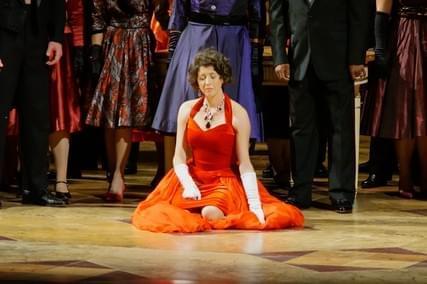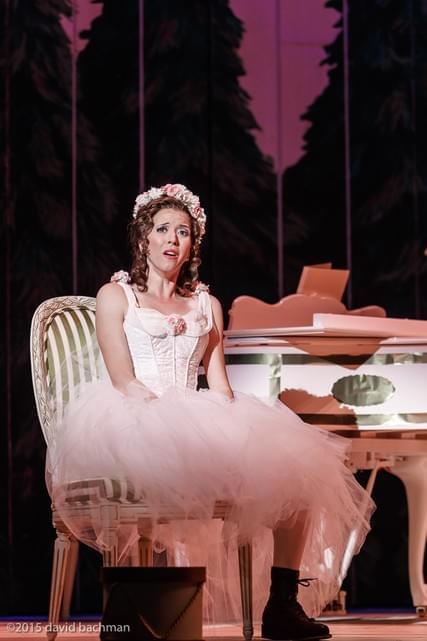2015
Teatro Real - Rigoletto
Nov, 2015 - Dec, 2015Crítica: 'Triunfo De Gilda'. 'Rigoletto' En El Teatro Real, Con Salsi, Oropesa Y Demuro
Notable la encarnación de Lisette Oropesa, una voz de lírico-ligera con cuerpo, impecablemente proyectada, bien colocada y correctamente apoyada sobre el aire. Buena la coloratura como pudo comprobarse en una brillante interpretación del “Caro nome” culminada por un trino largo y de buena factura. Estupendo también fue el mi bemol del final de la vendetta. Cierto es que el timbre no es especialmente bello ni singular y que a alguno de los filados que prodigó le faltó un punto de firmeza y posición, pero estamos, sin duda, ante una soprano con los papeles en regla, con control sobre su instrumento, sobre la intensidad del sonido, la respiración y los resortes del canto. Eso sí, en el aspecto interpretativo no es un prodigio de expresividad.The embodiment of Lisette Oropesa stands out, a voice that is light-lyric yet full-bodied, impeccably projected, well-placed, and correctly supported by breath control. Her coloratura skills were evident in a brilliant performance of "Caro nome," culminating in a long, well-executed trill. The high E-flat at the end of the vengeance aria was also superb. It's true that her timbre is not particularly beautiful or unique, and some of the sustained notes she produced lacked a bit of firmness and placement, but we are unquestionably facing a soprano who has her act together, with control over her instrument, sound intensity, breathing, and the mechanics of singing. That said, in terms of interpretive aspect, she is not a wonder of expressiveness.— Raúl Chamorro Mena • CodalarioBayerische Staatsoper - Rigoletto
Nov, 2015MÜNCHEN/ Bayerische Staatsoper: RIGOLETTO
Für die erkrankte Patricia Petibon übernahm dankenswerterweise kurzfristig Lisette Oropesa die Rolle der Gilda, die sie mit ihrem vollen, leuchtenden, farbenreichen Sopran sehr schön darbot.Due to Patricia Petibon's illness, Lisette Oropesa graciously stepped in at short notice to take on the role of Gilda, which she portrayed beautifully with her full, luminous, richly-coloured soprano.— Martina Bogner • Online MerkerBayerische Staatsoper - Die Entfuhrung aus dem Serail
Nov, 2015Opera Philadelphia - La traviata
Sep, 2015 - Oct, 2015LA TRAVIATA (Opera Philadelphia): A stunning new design and a stellar new Violetta
...and the outstanding Oropesa brings psychological depth and emotional expressiveness to her sympathetic character, ranging from–and equally masterful at–the ebullient bel canto and decorative coloratura of Act I to the scaled-down drama and poignancy of Act III.None— Debra Miller • phindieSkaneateles Festival
Houston Symphony - Carmina Burana
San Francisco Opera - Le Nozze di Figaro
Jun, 2015 - Jul, 2015‘Figaro’ in the shadows at S.F. Opera
Soprano Lisette Oropesa was a superb Susanna, singing with both delicacy and quick-witted allure. Her duet with the Count at the beginning of Act 3, in which Susanna pretends to be willing to accept his advances, was a particular high point.None— Joshua Kosman • SFGatePittsburgh Opera - The Daughter of the Regiment
May, 2015Pittsburgh Opera Ends Its 76th Season with Donizetti’s “Daughter of the Regiment.”
Of the singers, natural inclination leads us first to Lisette Oropesa, the silvery-voiced Marie, a world-renowned young soprano who already has over 100 performances with the Metropolitan Opera under her belt, and who last night presented more than adequate proof of her well-earned reputation. Lithe, lovely and agile, she was a delight throughout - vocally, visually, and histrionically. In addition to a remarkable voice of thrilling loveliness, she possesses outstanding talent as a comedienne. In the ballet lesson of Act Two, decked out in a flowing, billowy ballerina costume – and the combat boots she wore in Act One – her achievements were on a par with Lucille Ball’s attempt at learning the classical art of dance in the “I Love Lucy” episode we’ve all seen in reruns fifty times or more. In the pretty arias and ensemble numbers alike, her astonishing flights of coloratura were charmingly delightful. For a brief moment at the beginning of Act One, it seemed as if she might have a slight bit of difficulty in smoothly gliding down from her more florid flights, but this quickly disappeared, and she went on to create quite a sensation which was tumultuously approved by the audience at every opportunity.None— George B. Parous • The Pittsburgh StageNew Orleans Opera - Le Nozze di Figaro
Mar, 2015 - Apr, 2015N.O. Opera closes season with appealing ‘Marriage of Figaro’
As Susanna, Figaro’s bride-to-be, Louisiana-born and -raised Lisette Oropesa was taking on one of the most demanding roles in the soprano repertoire. Being in nearly every scene of a long opera can pose a serious challenge to a singer, but Oropesa rose to it. In her arias as well as in duets and ensemble pieces, Oropesa offered a fine display of vocal versatility, from the lilting coloratura of a young woman in love to the confusion and anger of the object of the lascivious intentions of her overlord, Count Almaviva.None— Thomas Hammon • New Orleans AdvocateChicago Bach Project - St John Passion
Mar, 2015'St. John Passion,' Rising Stars concert lifts voices and hearts
Lisette Oropesa brought her limpid, plaintively expressive voice to the two soprano arias.None— John von Rhein • Chicago TribuneConcertgebouw - Rigoletto
Mar, 2015Oropesa’s Gilda steelt show in Rigoletto
De show werd echter gestolen door Rigoletto’s dochter Gilda, vertolkt door de Amerikaanse sopraan Lisette Oropesa (vorig seizoen Nanetta in Falstaff bij De Nationale Opera). In haar stemgeluid lagen zowel een warme laagte als een glanzende hoogte besloten, en haar vocale acrobatiek was indrukwekkend. Vooral indrukwekkend was haar ‘Caro Nome’, dat in eerste instantie voortijdig moest worden afgebroken omdat iemand in de zaal onwel werd. Ze eindigde de aria met een prachtige triller waar maar geen eind aan leek te komen.However, the show was stolen by Rigoletto's daughter Gilda, portrayed by American soprano Lisette Oropesa (last season's Nanetta in Falstaff at The National Opera). Her voice contained both a warm depth and a shining height, and her vocal acrobatics were impressive. Particularly striking was her 'Caro Nome', which initially had to be cut short because someone in the audience fell ill. She ended the aria with a beautiful trill that seemed to go on forever.— Laura Roling • Place de l'OperaOpéra National de Paris - Die Entführung aus dem Serail
Dec, 2014 - Feb, 2015Parigi - Opéra Garnier: Il ratto dal serraglio
Ben affiatato anche il duo protagonista, con Lisette Oropesa nel ruolo di Konstanze in luogo della prevista Albina Shagimuratova. Anche lei soprano ancora giovane, al suo debutto a Parigi ma già Konstanze alla Staatsoper di Monaco, la Oropesa è stata premiata dal pubblico grazie a una prova molto convincente. Elegante e misurata in scena come si conviene al personaggio, ha persuaso per la sua capacità di mettere in rilievo anche nel canto gli stati d’animo, ora malinconici, ora rapiti, ora sdegnati che la parte prevede. Da ciò l’ottimo effetto di Welcher Wechsel herrscht in meiner Seele, sospirosa e malinconica, da ragazza più che da donna infelice nella voce della Oropesa, seguita da Marten aller Arten, cantata con accenti incisivi e appassionata recitazione.The lead duo was also well-groomed, with Lisette Oropesa in the role of Konstanze, replacing the scheduled Albina Shagimuratova. She is also a young soprano, making her debut in Paris, but already Konstanze at the Staatsoper in Munich, Oropesa was rewarded by the audience for a very convincing performance. Elegant and measured on stage as suits the character, she won over with her ability to highlight, even in the song, the different states of emotion - sometimes melancholic, sometimes enraptured, sometimes indignant - that the part requires. From this sprang the excellent effect of Welcher Wechsel herrscht in meiner Seele (What change rules in my soul), sighing and melancholic, more a young girl than an unhappy woman in Oropesa's voice, followed by Marten aller Arten (Of all types of marten), sung with incisive accents and passionate acting.— Lorenzo De Vecchi • Opera Click











